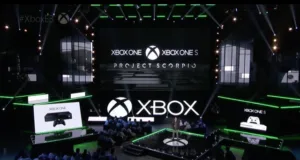At E3 2016, Microsoft revealed the expected new Xbox console, as well as discussing an interesting move that might actually give it an edge in the console market, where it has struggled to compete with Sony’s Playstation.
UltraHD video is the new hot topic in the display industry, and so it was something of a surprise when the Playstation 4 and Xbox One were launched with no support for the format. Now that UHD has become more firmly established (and has some standards behind it), Sony and Microsoft have both announced moves into the space. For Microsoft, that takes the form of the XBox One S and ‘Project Scorpio’.
Set to be released in August, starting at $300, the Xbox One S is 40% smaller than the existing console, with support for UltraHD video – it will be able to play UHD Blu-rays and streamed content. HDR will also be supported in both video and games using the CTA’s HDR10 specification. However, if you want UHD in your games, you’ll need to wait a little longer.
Microsoft will launch a new Xbox, code-named Project Scorpio, in time for the holiday 2017 period. It will have 6 TFLOPS (yes, Microsoft discussed teraflops at a gaming conference!) of GPU power, supporting UltraHD gaming and VR. The existing Xbox One reaches about 1.3 TFLOPS.
Interestingly, Scorpio will be part of the Xbox One family: all games developed for the Xbox One and One S will be playable on the Scorpio. However, Microsoft did not say whether or not it will enforce a similar system to that rumoured for Sony’s Playstation Neo, where games for the newer console must be playable on the older models.
Other interesting announcements included the addition of Cortana to the Xbox One (USA and UK initially); Cross-play, allowing Xbox and PC gamers to play cross-platform on certain titles; and Xbox Play Anywhere. Play Anywhere means that a game only needs to be purchased once, and will then be playable on the PC and Xbox.
Analyst Comment
Console generations last, on average, six-to-seven years, but Microsoft is committed to moving away from the whole ‘generations’ concept: Phil Spencer, the head of Xbox, has in the past said that he favours a modular approach to consoles, much like PCs work today. That brings with it a host of its own problems, of course: consoles have that ‘pick-up-and-play’ strength, because developers know that everyone is running the same hardware. ‘Moddable’ consoles would change that. (TA)

